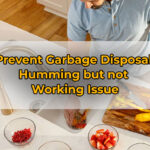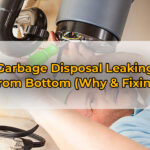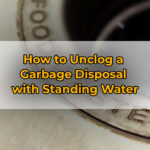Don’t risk your plumbing by throwing egg shells in garbage disposal! They’re too hard and could damage the blades or clog your kitchen sink drain.
To avoid damages, break them down into smaller pieces with a fork or grinder. Then add them to your compost pile. They’ll biodegrade and become nutritious soil for plants.
For clogs caused by eggshells still lingering inside your garbage disposal, try pouring boiling water down the sink. Add baking soda and vinegar which fizzles and removes any residue. Finally, run cold water while turning on the garbage disposal.
For prevention, run cold water while grinding food scraps in small batches. This ensures that waste is efficiently processed through pipes while keeping blades sharp. With these tips, you can tackle eggshell buildup without damaging your kitchen garbage disposal.
Here is more detailed explanation!
What Happens When You Put Egg Shells in Garbage Disposal?
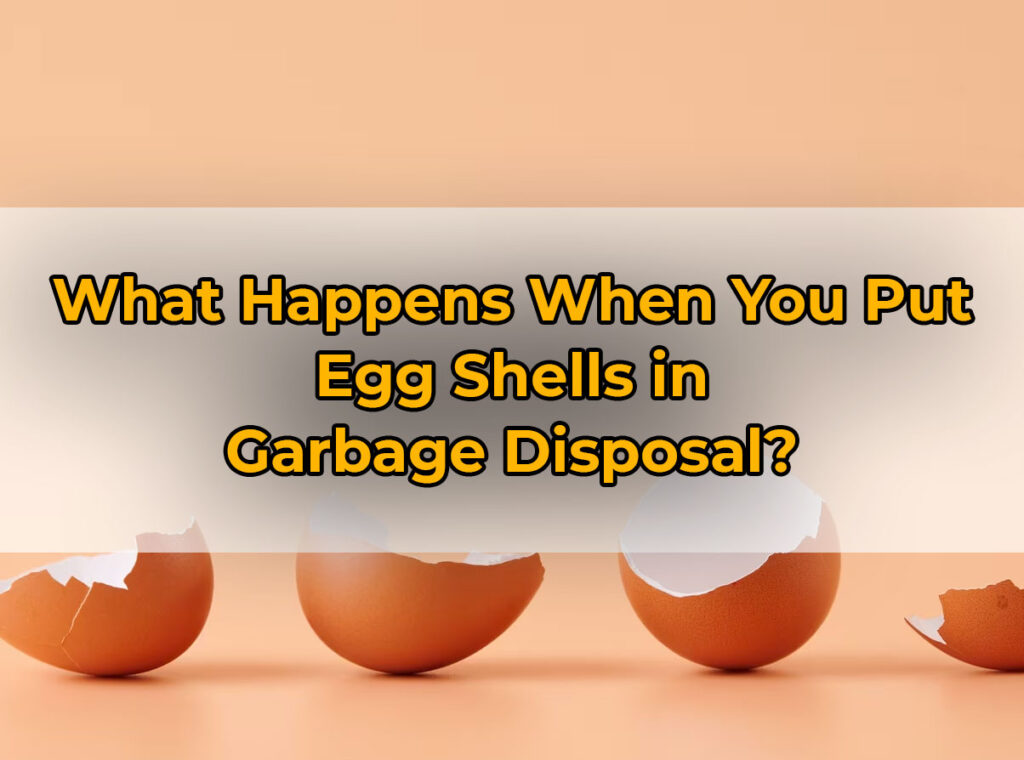
To prevent damage, clogging of the drain, and foul odor caused by eggshells in your garbage disposal, you must know the best way to dispose of them.
1. Damage Caused to Garbage Disposal
No egg shells for the garbage disposal! Those hard and tiny pieces can be a real hazard. They can clog up the blades and cause all sorts of damage. The abrasive nature of eggshells can wear away the blades, leading to motor burnouts and jams.
So, to keep your unit running smoothly, don’t throw any eggshells in the garbage disposal. That way, you can ensure its long life span!
2. Clogging of the Drain
Do not put eggshells into the garbage disposal! The sharp edges can stick to other particles and block the drain. This leads to slow drainage or complete backup, just like Coffee Grounds in Garbage Disposal.
Put them in the trash instead, or grind them into small pieces. Taking care of your drain system is important to avoid expensive repairs and inconvenience. Clean and maintain it regularly.
Save yourself stress and money by keeping the drain clean. Why buy scented candles when you can just throw egg shells into the garbage disposal for a truly unique aroma?
3. Foul Odor
Eggshells in the garbage disposal can trigger Garbage Disposal Smells. This is because of the decomposition of the shell fragments and any egg goo left on them. So, it’s wise to not put eggshells down the disposal regularly.
Being small, eggshells can still harm the garbage disposal blades. When crushed, sharp edges from the shells can damage them. This could lead to costly repairs and slower drainage causing blockages.
Rather than throwing away old eggs, there are other ways to use them. Composting or feeding them to backyard chickens are two great options. These methods keep the kitchen smelling fresh and avoid repairs.
It’s important to know what should and shouldn’t go in the disposal system. Avoid fees by following these disposal-friendly eggshell disposal methods!
Best Way to Dispose Egg Shells

To dispose of egg shells properly, composting and recycling are the best solutions for sustainability. Composting egg shells involves breaking them down into organic matter, while recycling them turns them into useful products.
1. Composting Egg Shells
Composting eggshells is an effective way to repurpose organic materials. Eggshells are a great source of calcium carbonate, making them perfect for soil and composts. Composting egg shells can help plants grow better by providing minerals.
Grind the shells into small pieces for quick decomposition. Add them to your compost pile mixture. Mix them in with other organic waste. Eggshells being alkaline can balance acidic soils. Mulch eggshells around plants to stop slugs and snails. Boiled eggshells can be a nutritious treat for birds.
Air, water and nitrogen are needed for eggshells to decompose. You can add food scraps for more nitrogen and faster decomposition.
Don’t throw away eggshells. Use them to create a garden fertilizer and save your composting system from cracking.
2. Recycling Egg Shells
Eggshells are a great way to recycle and reuse! Here are some ideas:
- Crush them and mix them into soil for a natural fertilizer.
- Grind them up and add them to a composter or garden.
- Place crushed shells around plants to prevent pests like slugs and snails.
- Fill halved shells with dirt to start seedlings.
- Bake shells at 300°F for 10 mins, then crush and scatter them for bird food.
- Grind cleaned shells into a fine powder for human or pet calcium supplements.
- Dye or paint them and use for decorations like potpourri, confetti, candles, or homemade bath bombs.
Recycling eggshells is awesome for the planet and your garden – plus, it’s a fun creative activity! So rethink your breakfast and get crackin’!
How to Clean Egg Shells in Garbage Disposal
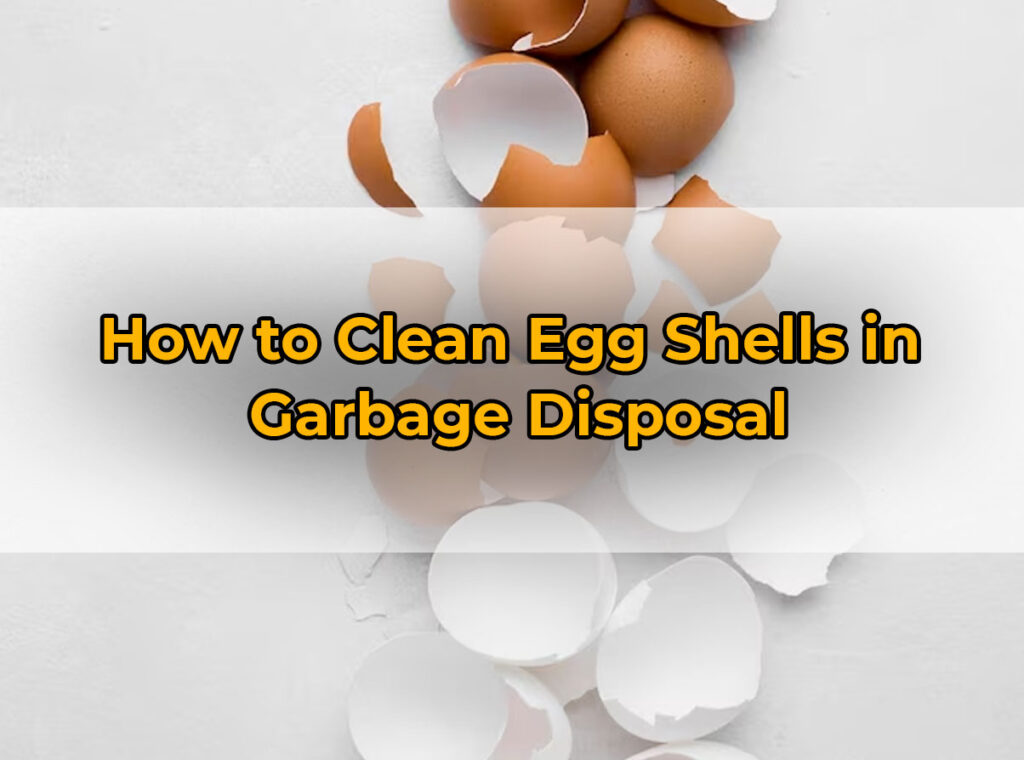
To clean egg shells in garbage disposal with ease, turn off the garbage disposal and follow these five steps:
1. Turning off the Garbage Disposal
To clean eggshells safely from a garbage disposal, follow these steps:
- Find the disposal switch. It’s usually under the sink and plugged in or hardwired.
- Shut off the circuit breaker that controls the unit.
- Make sure the switch or button is off. If desired, unplug it from its electrical source.
- Run cold water through the disposal for a few seconds to clear any leftovers.
- Clean the eggshells with vinegar or bleach.
Remember: never try to clean materials while the disposal is running – it’s dangerous! Safety comes first when dealing with home appliances, especially those using electricity and sharp blades like garbage disposals. Follow these steps for a safe and effective cleaning of eggshells in your disposal.
2. Removing Large Pieces of Egg Shells
If you’re looking for a way to get rid of pesky eggshells from your garbage disposal, we’ve got the answer. Here’s how to remove big eggshell pieces safely and efficiently:
- Always switch off the power before starting any cleaning or maintenance.
- Use tongs or pliers to grab any visible large pieces of eggshell.
- Pour a cup of hot water down the sink if needed, to break up any remaining bits.
It’s important to be extra careful when dealing with garbage disposals. Don’t put any large chunks of food or non-food items into the disposal.
Keeping up with kitchen appliance maintenance is key!
By following these simple steps, you can make sure your garbage disposal is in tip-top shape for years to come. Don’t risk costly repairs or replacements – take some time to clean and maintain your equipment. Plus, run cold water for those dirty egg shells – coffee won’t do it alone!
3. Running Cold Water
Don’t flush egg shells down the drain! Running Cold Water will help. It hardens grease and oils, making them easier to cut up. Make sure the water is on full flow when cleaning eggshells in the disposal unit. Cold water is better than hot, as it will harden and not melt fatty materials.
Proper maintenance of your garbage disposal is important. You’ll save money on repairs and your unit will last longer. Running Cold Water when disposing of eggshells and food waste is key to avoid clogs, leaks, or backflows.
Try a DIY concoction of vinegar and baking soda to clean your garbage disposal, or just toss eggs shells in and hope for the best.
4. Using Vinegar and Baking Soda Solution
Got egg shells in your garbage disposal? No problem! With vinegar and baking soda, you can easily clean it out. Here’s how:
- Pour half a cup of baking soda down the drain followed by one cup of vinegar.
- Put a stopper on the drain to prevent fizzing.
- Wait 10 mins and remove the stopper. Then, run hot water for a few seconds.
- Turn off the hot water and switch to cold water and flush the disposal.
- Done!
Remember, this method is only helpful for leftover debris. Don’t put large amounts of egg shells in your disposal. They can clog or damage the blades. Instead, toss them in compost bins. Let nature do its work. In addition, use this tips to Unclog a Garbage Disposal with Standing Water.
Pro Tip: Make ice cubes out of the egg shells and clean like a pro!
5. Using Ice Cubes
Ice cubes are a good way to clean eggshell residue from the garbage disposal. Here’s how:
- Run hot water down the drain.
- Pour in some ice cubes.
- Turn on the disposal and let it grind them.
- This breaks up any eggshell residue and cleans the blades.
- Keep running cold water for a few minutes after grinding.
- Repeat this process once a month or as needed.
Be careful not to put too many ice cubes in, and avoid using with citrus rinds. To help prevent blockage, crush eggshells before putting them in the drain. Cleaning eggshells isn’t easy, but these tips will help! Check also: Garbage Disposal Wont Turn Off.
Do egg shells make the garbage smell?
NO! The main reason for a bad smell in the garbage is the decomposition of organic matter. When food waste breaks down, it releases sulfur compounds such as hydrogen sulfide and mercaptans, which result in an unpleasant aroma.
Eggshells by themselves do not cause any foul smell; they only add to the volume of waste in the bin. However, if there are already other decomposing materials present in the garbage, adding eggshells may exacerbate the stench.
Another factor that can contribute to an odor problem is how often you empty your trash bin.
Are eggshells organic waste?
Yes! eggshells can be classified as organic matter, meaning they come from living organisms and contain carbon compounds, they don’t decompose easily.
When eggshells are thrown into the trash or compost bin, they take years to break down due to their hard outer layer. However, when crushed into small pieces or powdered, eggshells can be composted effectively and turn into nutrient-rich material for plants. They also have calcium carbonate which is beneficial for soil pH levels. Therefore, it’s essential to crush them before throwing them away or adding them to your garden bed.
Do eggshells in compost attract rats?
NO, The truth is, eggshells alone are unlikely to attract rats. Rats are attracted to food waste such as meat scraps and dairy products that emit strong odors. Compost piles with a balanced mix of green (nitrogen-rich) and brown (carbon-rich) materials tend to have minimal odors and therefore reduce the risk of attracting rodents.
“There is no real ending. It’s just the place where you stop the story.”

